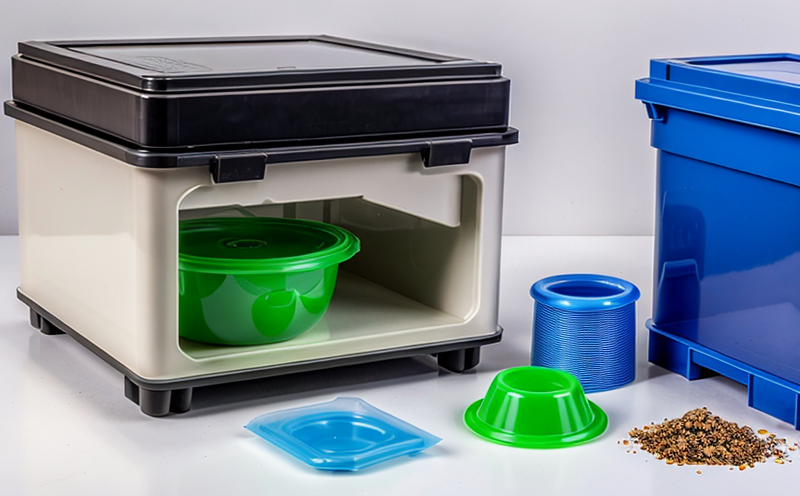ASTM D3763 High Speed Puncture Impact Testing of Plastics Packaging
The ASTM D3763 high-speed puncture impact test is a critical procedure in polymer and plastics testing, specifically designed to evaluate the resistance of plastic packaging materials against sudden mechanical impacts. This test simulates real-world conditions where packaged goods might experience sharp or pointed objects during transportation, handling, and storage.
This method measures the energy absorption capacity of the material under dynamic loading conditions, providing valuable insights into the structural integrity and durability of plastics used in packaging applications. The high-speed nature of this test allows for precise measurement of how quickly a puncture occurs and the subsequent deformation behavior of the plastic film or sheeting.
The procedure involves using a specially designed punch that moves at a controlled rate to penetrate the specimen mounted on a rigid fixture. The force required to achieve penetration is measured, along with the time taken from impact until complete failure. This data helps in determining not only the mechanical strength but also the toughness of the plastic material.
For effective testing, it's essential that the specimens are prepared following strict guidelines outlined in ASTM D3763. These include specific dimensions and thicknesses to ensure consistent results across different samples. Proper sample preparation ensures accurate measurements and repeatability, which is crucial for quality assurance and compliance with international standards.
The equipment used for this test includes a specialized high-speed penetrometer capable of generating rapid impacts while accurately measuring force and time parameters. This machine must be calibrated regularly to maintain precision and reliability throughout the testing process.
Understanding the results from ASTM D3763 tests is vital for optimizing packaging designs that balance cost-effectiveness with necessary safety requirements. By identifying weak points in material performance early on, manufacturers can make informed decisions about material selection or design modifications to enhance product protection without compromising other essential properties like flexibility or transparency.
Compliance with ASTM D3763 ensures that packaging meets rigorous standards set forth by industry experts and regulatory bodies worldwide. It plays a key role in ensuring consumer safety while minimizing environmental impact through more efficient use of resources during production processes.
In summary, the ASTM D3763 high-speed puncture impact test offers valuable information about the mechanical properties of plastic packaging materials under dynamic loading conditions. Its application spans various industries including food & beverage, pharmaceuticals, electronics, and retail, making it an indispensable tool for quality assurance professionals responsible for maintaining high standards in their respective fields.
Benefits
The ASTM D3763 test offers several advantages that make it a preferred choice among manufacturers and researchers working with plastic packaging materials:
Enhanced Product Safety: By simulating actual impact scenarios, this test helps identify potential weak points in the design or composition of packaging films. Early detection allows for corrective actions before products reach market shelves.
Improved Material Selection: Results from ASTM D3763 can guide material scientists towards selecting more appropriate polymers that offer better resistance to punctures and impacts, enhancing overall product performance without increasing costs excessively.
Cost Efficiency: Early identification of problematic areas through testing reduces the need for costly redesigns later in development cycles. Additionally, improved durability leads to longer shelf lives for packaged goods, reducing waste due to premature failure.
Regulatory Compliance: Adherence to ASTM standards ensures that packaging meets stringent regulatory requirements set by governments and international organizations like ISO or EN. This fosters trust among consumers who expect safe products meeting high quality expectations.
Environmental Considerations: Understanding how different types of plastic respond to punctures allows for more sustainable practices in manufacturing processes, promoting the use of recyclable materials where possible while minimizing waste generation during production stages.
Eurolab Advantages
At Eurolab, we pride ourselves on offering comprehensive testing services that go beyond mere compliance checks. Our expertise lies in providing tailored solutions based on clients' unique needs and challenges:
Comprehensive Testing Capabilities: With state-of-the-art facilities equipped with advanced instrumentation, including high-speed penetrometers for ASTM D3763 testing, Eurolab ensures accurate and reliable results every time.
Experienced Technicians: Our team comprises highly qualified professionals who stay updated on the latest developments in polymer science and materials engineering. This knowledge base enables us to provide insightful interpretations of test outcomes along with practical recommendations for improvement.
Global Recognition: As a certified laboratory recognized by numerous international bodies, including ISO 17025, our tests are accepted worldwide, ensuring seamless integration into global supply chains.
Dedicated Client Support: From initial consultation to post-test analysis, Eurolab offers personalized assistance throughout the entire testing process. Our goal is not just compliance but also continuous improvement in product quality and sustainability practices.
Environmental and Sustainability Contributions
The ASTM D3763 test plays a significant role in promoting environmental responsibility within the packaging industry by encouraging the use of eco-friendly materials that meet stringent performance criteria. By ensuring that plastic packaging can withstand impacts without compromising safety, manufacturers are motivated to explore greener alternatives such as biodegradable or recycled content polymers.
This focus on sustainability extends beyond material selection to include lifecycle analysis (LCA) which considers all stages from raw material extraction through end-of-life disposal. Through rigorous testing like ASTM D3763, we contribute towards creating circular economies where waste is minimized and resources are used efficiently.
Moreover, understanding the puncture resistance of plastics allows for optimizing packaging design to ensure minimal excess material usage, thereby reducing both production costs and environmental footprint. This holistic approach ensures that every aspect of plastic packaging contributes positively towards achieving sustainable development goals.





